KEYNOTE AND PLENARY SPEAKERS (Partial Listing) |
|
Tuesday, 27 November 2007 • 8:00 am - 9:30 am
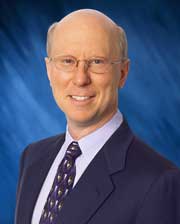 |
Scott McGregor
CEO
Broadcom |
Scott McGregor is the President and Chief Executive Officer of Broadcom. In this role, he is responsible for guiding the strategic direction of the company, business development and day-to-day operations.
Mr. McGregor, who is also a member of the Board of Directors, joined Broadcom in January 2005 after serving since September 2001 as President and CEO of the Philips Semiconductors division of the Netherlands-based Royal Philips Electronics, At Philips, Mr. McGregor oversaw one of the world's largest semiconductor suppliers, with 34,000 employees in over 50 countries and nearly US$6 billion in sales in 2004. In addition to his CEO role, he was also a member of the Group Management Committee of Royal Philips Electronics. He joined Philips Semiconductors in February 1998 as head of its Emerging Business unit, focusing on fast growing markets for smart cards, RFID, networking, digital media processing and computing, and leading the group to profitability and nearly US$1
billion in sales.
Before joining Philips, from 1990 to 1998 Mr. McGregor served in various senior management positions, most recently as Senior Vice President and General Manager, at Santa Cruz Operation Inc. (SCO), a provider of network computing solutions. From 1985 to 1990 he served in senior positions at Digital Equipment Corporation (now part of HP) where he led the UNIX workstation software group and was one of the architects of the X Window System. Prior to joining Digital Equipment Corporation, he worked at Microsoft, where he was the Director of the Interactive Systems Group and the architect and development team leader of the original version of Microsoft(r) Windows(r). Prior to Microsoft, Mr. McGregor spent over six years in various positions at the Xerox Corporation's Palo Alto Research Center (PARC), where he was involved in designing software for the first personal computers employing graphical user interfaces. Mr. McGregor received a B.A. in Psychology and a M.S. in Computer Science and Computer Engineering from Stanford University. |
Tuesday, 27 November 2007 • 8:00 am - 9:30 am
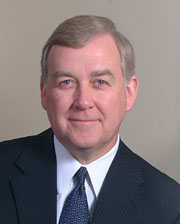 |
Mark A. Wegleitner
Senior Vice President, Technology & Chief Technology Officer
Verizon Communications |
Mark Wegleitner is Senior Vice President – Technology and Network Planning, and Chief Technology Officer (CTO) for Verizon Communications. His responsibilities include technology assessment, network architecture, platform development and laboratory testing for the local and long distance wireline communications businesses, as well as network planning for local wireline communications. In his current role, he and his organization support all wireline business units in the management of technology and network matters.
Prior to his current assignment, Mr. Wegleitner served as Vice President, Technology & Engineering at Bell Atlantic Network Services, where he was responsible for all technology and engineering functions. Before that, he was CTO at Bell Atlantic Network Services. Since joining Bell Atlantic, he has also held a variety of other management positions in strategic planning, network architecture, technology development, information systems, research and development, broadband implementation and new services technology.
Mr. Wegleitner began his career with Bell Telephone Laboratories in local switching systems development. He later joined the exchange switching systems design organization at AT&T General Departments, where he had responsibility for the introduction of new features and services on local switching systems. He held another brief assignment with Bell Laboratories in local switching systems engineering before transferring to Bell Atlantic.Mr. Wegleitner received a B.A. in mathematics from St. John's University, and an M.S. in electrical engineering and computer science from the University of California at Berkeley.
|
Tuesday, 27 November 2007 • 6:15 pm - 7:15 pm
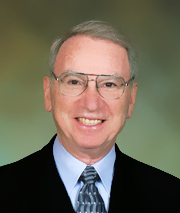 |
Master of Ceremonies
Dr. Irwin Jacobs
Co-Founder and Chairman
QUALCOMM, Inc. |
Dr. Irwin Mark Jacobs co-founded QUALCOMM Incorporated, pioneer and world leader of Code Division Multiple Access (CDMA) digital wireless technology, in July of 1985 and currently serves as the Company’s chairman. QUALCOMM’s major business areas include CDMA chipsets and system software; technology licensing; the Binary Runtime Environment for Wireless™ (BREW™) applications platform; QChat™ push-to-talk technology; Eudora® e-mail software; digital cinema systems; and satellite-based systems including wireless fleet management systems, OmniTRACS® and OmniExpress®. The Company is included in the S&P 500 Index and is a 2005 FORTUNE 500® company traded on the Nasdaq Stock Market® under the ticker symbol QCOM. Dr. Jacobs previously served as co-founder, president, chairman and CEO of LINKABIT® Corporation. He guided the growth of LINKABIT from a few part-time employees in 1969, to over 1,400 employees in 1985, with offices in San Diego, Boston and Washington, D.C. In August 1980, LINKABIT merged with M/A-COM, Incorporated and in February 1981, Dr. Jacobs became a member of M/A-COM’s board of directors. In February 1983, he became executive vice president of M/A-COM and subsequently a member of the office of the president. While at LINKABIT and M/A-COM, Dr. Jacobs led the development of the Air Force Dual Modem, the first commercial VSAT, VideoCipher® and the first commercial TDMA digital wireless handset, among other products. In April 1985, he resigned from M/A-COM. From 1959 to 1966, Dr. Jacobs was an assistant/associate professor of electrical engineering at Massachusetts Institute of Technology (MIT) and a staff member of the Research Laboratory of Electronics. During the 1964-1965 academic year, he was a NASA Resident Research Fellow at the Jet Propulsion Laboratory. In 1966, he joined the newly formed Department of Applied Electrophysics (now Electrical and Computer Engineering) at the University of California, San Diego (UCSD). In 1972, he resigned as Professor of Information and Computer Science to devote his full-time attention to LINKABIT.
While at MIT, Dr. Jacobs co-authored a basic textbook on digital communications entitled, Principles of Communication Engineering. First published in 1965, the book is still in use today. Dr. Jacobs retains his academic ties through the University of California President’s Engineering Advisory Council and the visiting committee of the MIT Laboratory for Information and Decision Systems. He is a past chairman of the Scientific Advisory Group for the Defense Communications Agency and of the Engineering Advisory Council for the University of California and a past academic/scientific member of the Technion International Board of Governors. Dr. Jacobs received a bachelor’s degree in electrical engineering in 1956 from Cornell University and master of science and doctorate of science degrees in electrical engineering from MIT in 1957 and 1959, respectively. In November 2006, Dr. Jacobs was named Chair of the Salk Institute’s Board of Trustees.
Dr. Jacobs is a member of a number of industry and community boards and committees. He is a Fellow of the IEEE and a member of Sigma XI, Phi Kappa Phi, Eta Kappa Nu and Tau Beta Pi. In 1997, he was elected membership to the Council on Competitiveness, a nonpartisan, nonprofit forum comprised of chief executives from business, university and labor communities. The Council sets a national action agenda for U.S. leadership, in the areas of the global markets and technological innovation, education and training, to raise the standard of living for all Americans. In 1982, he was elected to membership in the National Academy of Engineering for his “contributions to communication theory and practice, and leadership in high-technology product development.” Dr. Jacobs is also a member of the California Council on Science and Technology, serves on the board of directors of Building Engineering & Science Talent, is on the visiting committees of the MIT Laboratory for Information and Decision Systems, serves on the UCSD Foundation Board of Trustees, and is past chairman of the University of California President’s Engineering Advisory Council. |
Tuesday, 27 November 2007 • 6:15 pm - 7:15 pm
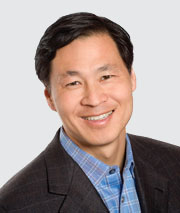 |
KEYNOTE SPEAKER
Dr. Jeong Kim
President
Bell Labs at Alcatel-Lucent |
Dr. Jeong H. Kim’s career is a unique synthesis of academic distinction and technical, entrepreneurial, and organizational leadership. Businessman and teacher, philanthropist and former nuclear submarine officer, Dr. Kim is currently President of Bell Labs, the communication industry's most heralded research organization. Dr. Kim’s executive mission is to infuse Bell Labs’ research and development with an entrepreneurial spirit that generates revolutionary technologies and dramatic impact in the marketplace.
Jeong Kim was born in Seoul, South Korea. He emigrated to the United States with his family at 14 and entered public school in Maryland speaking no English. At 16 he left home, worked odd jobs to support himself through high school, and won a place at Johns Hopkins University, where in three years he completed degrees in electrical engineering and computer science while working for Digitus, a technology start-up in which he became a partner.
After a seven-year stint in the U.S. Navy—a period in which he took a master’s degree in technical management from Hopkins—Kim joined AlliedSignal to work at the Naval Research Laboratory, simultaneously earning a PhD in reliability engineering from the University of Maryland.
In 1992, Dr. Kim launched Yurie Systems, the enterprise that would define him as one of the nation’s most successful high-tech entrepreneurs. Yurie was built around an enormously flexible and robust asynchronous transfer mode technology that streamlined data communications between different systems. So successful was Yurie’s switch that, in February 1997, Dr. Kim took the firm public; in May, Business Week ranked Yurie the #1 Hot Growth Company among all public companies in the United States. In 1998, Lucent Technologies acquired Yurie for $1.1 billion in cash. Dr. Kim was named Ernst & Young’s National Emerging Entrepreneur of the Year.
Until 2001, Dr. Kim stayed on with Lucent and successfully led a major turnaround effort of its multi-billion dollar Optical Networking Group’s business as the Group President. Then, he returned to the University of Maryland to teach engineering. He rejoined Lucent (now Alcatel-Lucent) in 2005 as the 11th President of Bell Labs. He has been widely recognized for his diverse accomplishments. A member of the prestigious National Academy of Engineering and of the Washington Business Hall of Fame, he was inducted into the University of Maryland’s Innovation Hall of Fame in 2004. The university also named its new Jeong H. Kim Engineering Building in his honor.
Dr. Kim serves on the boards of many academic, corporate, and nonprofit organizations, including the NASDAQ Listing and Hearing Review Council.
|
Wednesday, 28 November 2007 • 8:00 am - 9:30 am
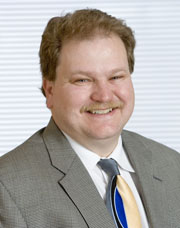 |
Matt Bross
Chief Technology Officer
BT Group |
Matt Bross, BT Group CTO, is responsible for setting the BT Group technology strategy and the vision and direction of innovation across BT. In his role at BT, Matt is responsible for BT’s Research and Venturing efforts globally. Matt is the leading force behind BT’s multi-billion pound, 21st Century Network transformation, and is leading innovation for BT. He has served on the Boards of many companies providing strategic technology and business leadership. He is a commissioner of the Global Information Infrastructure Commission (GIIC) since December 2005, as Regional Director for Europe. GIIC is a confederation of CxO level executives engaged in the development, deployment, operation, financing, and use of ICT services and products.
Matt is also a board member of the Alliance for Telecommunications Industry Solutions (ATIS), a United States based body focusing on the development and promotion of technical and operations standards for the communications and related information technology industry globally. ATIS is accredited by the American National Standards Institute (ANSI). Matt is the Chairman on the Board of Advisors for the Global Innovation Research Centre (GIRC), the organisation that works to foster innovation in Malaysian Government, industry and education sectors.Matt is widely regarded as a visionary speaker on media and telecommunications issues globally. He is married with 5 children and proud to have one of the coolest jobs on the planet.
|
Wednesday, 28 November 2007 • 8:00 am - 9:30 am
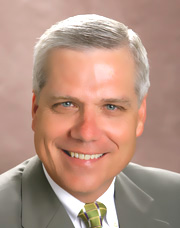 |
Ernie J. Carey
Senior Vice President at Network Services, AT&T Southwest
AT&T Operations, Inc. |
Ernie J. Carey, Senior Vice President-Network Services for AT&T Southwest, is responsible for various network and operation functions across AT&T. In Texas, Oklahoma, Missouri, Kansas, and Arkansas, his area of responsibility includes all installation, repair, construction, engineering and surveillance functions. Mr. Carey’s Mass Market Customer Care organization provides service delivery and assurance for broadband as well as service assurance for narrowband products across the AT&T 22-state footprint. He was appointed to his current position in July 2007.
Prior to his current position, Mr. Carey was Vice President, Advanced Network Technologies, responsible for the network planning and engineering for AT&T’s premier video offering, AT&T U-verseSM TV. Mr. Carey was responsible for expanding AT&T’s fiber-optics network deeper into neighborhoods to deliver AT&T U-verse TV, voice and high speed Internet access services.
Mr. Carey began his career with Southwestern Bell in 1975 in Houston, Texas, after graduating from college and holds both BBA and MBA degrees. Mr. Carey progressed through a series of operations, engineering, and marketing jobs in Southwestern Bell/SBC.
Mr. Carey is a former member of the Board of Directors of the Sam Houston Council of the Boy Scouts of America. He was appointed by then Governor Bush as a member of the Commission on State Emergency Communications and also served for eight years on the Board of Directors of the Greater Harris County E911 District. In addition, he is a board member of the Houston Technology Advisory Board as well as the Technology Opportunity Institute. Finally, Mr. Carey is a member of the Engineering Advisory Board, College of Engineering, The University of Houston.
Ernie has been married to his wife Marylin for 26 years and they have one son, Robert.
Wednesday, 28 November 2007 • 12:00 pm - 1:45 pm
 |
Grant Seiffert
President
Telecommunications Industry Association |
Grant Seiffert brings more than 15 years of experience to his role as President of the Telecommunications Industry Association. As President of TIA, he is responsible for defining and overseeing the execution of the association's strategic vision, spanning membership, operations, business development, standards development, security, and legislative and regulatory affairs. Having spent nearly his entire career working in and around telecom, Seiffert has the background necessary to effectively identify and prioritize critical and evolving issues and technologies, ensuring TIA is well-positioned to advocate on behalf of its member
companies on the international stage.
Seiffert spent the first five years of his career working as a legislative aide to Arizona Senator John McCain. Beginning in 1994, he was Senator McCain's primary representative for all legislative activities related to what became the 1996 Telecom Act. In that capacity, Seiffert
participated in Senate Commerce Committee meetings and worked closely with the Senator to formulate his telecom policy.
Seiffert sits on the Board of Directors for NXTcomm, the communications industry's premier event, as well as on ITU Telecom’s Board of Directors.
He received his Bachelor of Science degree in Political Science from Radford University in 1991.
|
|
Thursday, 29 November 2007 • 8:00 am - 9:30 am
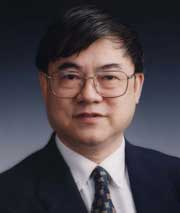 |
Prof. Wu Hequan
Vice President of Chinese Academy of Engineering |
Wu Hequan graduated from Wuhan Post and Telecommunications Institute in 1964. Wu Hequan has work for the China Academy of Post and Telecommunications (CAPT) of MPT since 1964. He was Vice President and Chief Engineer of the China Academy of Telecommunications Technology (CATT) from 1997 to 2003. He has studied optical fiber transmission system and broadband network and managed R&D projects. In recent years, he has focused on the development strategy of NGN and NGI as well as 3G. He was elected the Academician of the Chinese Academy of Engineering (CAE) in 1999 and Vice President of CAE since June 2002. He is currently serving as the Vice Director of the Advisory Committee for the State Informatization of China as well as the Vice Director of the Executive Council of the China Institute of Communications (CIC) and the Chinese Institute of Electronics (CIE), respectively. He is an advisor to the Communication S&T Committee of MII and a member of the Advisory Committee of the National Basic Research Program of China (973 Plan). He serves as the Director of the Experts Committee of China's Next Generation Internet (CNGI) project. He was a senior member of IEEE. |
Thursday, 29 November 2007 • 8:00 am - 9:30 am
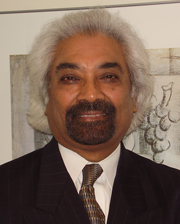 |
Sam Pitroda
Chairman, C-SAM, Inc. |
Mr. Sam Pitroda is an internationally respected development thinker, telecom inventor and entrepreneur who has spent 40 years in Information and Communications Technology and related human and national developments.
Credited with having laid the foundation for and ushered India’s technology and telecommunications revolution in the 1980s, Mr. Pitroda has been a leading campaigner to help bridge the digital divide. During his tenure as Advisor to Prime Minister Rajiv Gandhi in the 1980s Mr. Pitroda headed six technology missions related to telecommunications, water, literacy, immunization Dairy and oil seeds. He was also the founder and first chairman of India’s Telecom Commission.
Currently he is chairman of India’s National Knowledge Commission reporting to the Prime Minister.
He holds over 50 worldwide patents and has published and lectured widely in the US, Europe, and Asia. |
Thursday, 29 November 2007 • 10:00 am - 11:45 am
 |
Fred Baker
Former Internet Engineering Task Force (IETF) Chair, Former Internet SOCiety (ISOC) Chair, Cisco Fellow |
Fred Baker was Internet Engineering Task Force (IETF) chair from 1996 to 2001. He has been active in the networking and communications industry since the late seventies, working successively for CDC, Vitalink, ACC, and Cisco Systems. He is currently a Fellow and Senior Technologist at Cisco. He has chaired a number of IETF working groups, including Bridge MIB, DS1/DS3 MIB, ISDN MIB, PPP Extensions, IEPREP, and IPv6 Operations, and served on the Internet Architecture Board 1996-2002. He has co-authored or edited around 40 RFCs and contributed to many more. The subjects covered include network management, OSPF and RIPv2 routing, quality of service (using both the Integrated services and Differentiated Services models), Lawful Interception, Precedence-based services on the Internet, and others. He is currently a member of the Board of Trustees of the Internet Society, having served as its chair from 2002 through 2006, chair of the IPv6 Operations Working Group in the IETF, a member of the IETF Administrative Oversight Committee, and a member of the Technical Advisory Council Technical Advisory Council of the Federal Communications Commission. |
Thursday, 29 November 2007 • 10:00 am - 11:45 am
 |
Peter Tseronis
Chairperson of the Federal IPv6 Working Group Director, Network Services, U.S. Department of Education |
Peter Tseronis is the Chairperson of the Federal IPv6 Working Group and Director of Network Services at the U.S. Department of Education. Additionally, he is engaged in key government-wide leadership as a voting member on the Interagency Management Council for Federal Telecommunications, a board member of the Independent Telecommunications Pioneer Association, a government advisory panel member for the American Council for Technology/Industry Advisory Council’s Networks and Telecommunications special interest group, and vice-president in charge of Programs for the Association for Federal Information Resources Management. Having started his federal career more than 16 years ago as a management analyst at the Pentagon for the U.S. Army, Tseronis’ leadership skills were rapidly recognized as he continued his career in financial systems modernization, procurement system management, and security oversight related to program management, among many other notable responsibilities. Mr. Tseronis received his B.A. in Communications from Villanova University and earned his M.S. in Information and Telecommunication Systems from Johns Hopkins University in Baltimore, MD. |
Thursday, 29 November 2007 • 12:00 pm - 1:45 pm
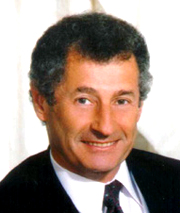 |
Dr. Leonard Kleinrock
UCLA |
Dr. Leonard Kleinrock created the basic principles of packet switching, the technology underpinning the Internet, while a graduate student at MIT. In this effort, he developed the mathematical theory of data networks. This was a decade before the birth of the Internet which occurred when his host computer at UCLA became the first node of the Internet in September 1969. He wrote the first paper and published the first book on the subject; he also directed the transmission of the first message to pass over the Internet. He was also responsible for setting up and running the Internet measurement facility that stressed the early Internet to establish its performance limits and to evaluate its performance and behavior. In these efforts, he laid the groundwork and established the discipline by which future generations of engineers would seek to model, measure and evaluate the computer and communication systems they were building. He was listed by the Los Angeles Times in 1999 as among the "50 People Who Most Influenced Business This Century", was listed as among the 33 most influential living Americans in the December 2006 Atlantic Monthly and in October, 2007 PC World listed his supervision of the first Internet message as the fourth greatest moment among “The 16 Greatest Moments in Web History”.
Dr. Kleinrock received his Ph.D. from MIT in 1963 and has served as a professor of computer science at the University of California, Los Angeles since then, serving as chairman of the department from 1991-1995. He received his BEE degree from CCNY in 1957. He has also received honorary doctorate degrees from CCNY (1997), the University of Massachusetts, Amherst (2000), the University of Bologna (2005), Politecnico di Torino (2005) and the University of Judaism (2007). He founded and co-founded a number of companies including: Linkabit Corporation - 1968 (serving as its first President); Technology Transfer Institute – 1976; Computer Channel Inc – 1988; Nomadix, Inc – 1998; Platformation – 2006. He has published more than 250 papers and authored six books on a wide array of subjects including queueing theory, packet switching networks, packet radio networks, local area networks, broadband networks, gigabit networks, peer-to-peer networks, intelligent agents and nomadic computing.
Dr. Kleinrock is a member of the American Academy of Arts and Sciences, a member of the National Academy of Engineering, an IEEE fellow, an ACM fellow, an IEC Fellow, an INFORMS Fellow, and a founding member of the Computer Science and Telecommunications Board of the National Research Council. Among his many honors, he is the recipient of the CCNY Townsend Harris Medal, the CCNY Electrical Engineering Award, the Marconi International Prize, the L.M. Ericsson Prize, the NAE Charles Stark Draper Prize, the Okawa Prize, the IEEE Internet Millennium Award, the C&C Prize, the UCLA Outstanding Teacher Award, the Lanchester Prize, the ACM SIGCOMM Award, the ACM Test of Time Award, the Sigma Xi Monie Ferst Award, the INFORMS Presidents Award, the IEEE Harry Goode Award, and numerous others.
|
|

















